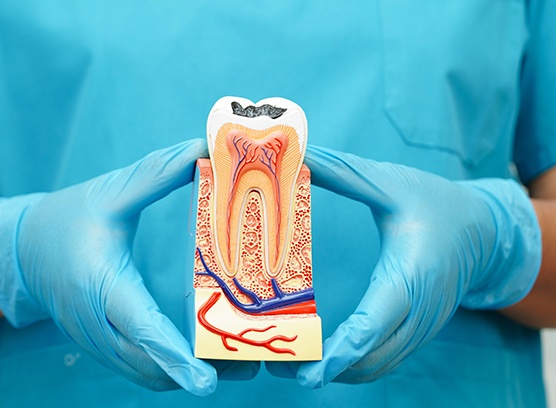Root Canal Therapy Phoenix
End Your Toothache & Save Your Tooth
A severe toothache can be one of the most distracting types of pain. It can make it difficult just to get through the day! If you are suffering from this issue, our Phoenix dental team is ready to help. After an examination, we might recommend that you undergo root canal therapy (which is also known simply as a root canal). This treatment has the potential to end your toothache and save your tooth! Get in touch with us to learn more or to request a consultation.
Why Choose Bell Road Dental Care of Phoenix for Root Canal Therapy?
- Advanced Laser Dentistry
- Comfortable & Precise Care
- Flexible Payment Options
Do I Need Root Canal Therapy?

Teeth have three layers. When the innermost layer, known as the pulp, gets damaged or infected, it can lead to the need for root canal therapy.
Here are some signs that you might need this treatment:
- You have a severe, throbbing toothache.
- A tooth is extremely sensitive to hot and cold temperatures.
- A tooth is visibly darker than the ones around it.
- There is an abscess (which might look like a pimple) on your gums.
- A tooth has visible signs of damage, such as a crack, chip, or large cavity.
In some cases, a root canal is necessary even when no obvious symptoms are present. That is one reason why regular dental checkups are so important!
The Root Canal Process

One of the first things we do during root canal therapy is administer a numbing agent. Local anesthetic can make sure that you feel very little during your treatment. Once you are comfortable, we will use special tools to access the tooth’s interior and remove any infected or damaged tissue from within it. We may also use a laser to sanitize the inside of your tooth and minimize the risk that infected tissue will be left behind.
Next, we will fill in your tooth with an inert material called gutta-percha. Afterward, you will likely need a crown to protect the tooth from additional damage.
The Benefits of Getting a Root Canal

While root canal therapy has a bad reputation, the truth is that it can be truly wonderful! As a result of this treatment, you might experience the following benefits:
- Pain-free function from your treated tooth. Because root canal therapy involves removing a tooth’s nerve, you might never experience pain in your treated tooth again.
- Results that last for years. A successful root canal can provide results that last for decades.
- The ability to keep your natural tooth. This can spare you from having to pay thousands of dollars for tooth replacement.
- A beautiful smile. We offer lifelike dental crowns that are almost indistinguishable from natural teeth.
Understanding the Cost of Root Canals

If your dentist has informed you that you need a root canal, you may be wondering how much this treatment will cost. Because each patient and situation are very different, the price for this procedure will vary. Furthermore, factors like dental insurance may also change what your total out-of-pocket responsibility will be. Here’s a closer look at what goes into determining the cost of a root canal.
Factors That Can Affect Root Canal Cost

It’s difficult for us to determine the exact cost of your root canal until someone on our dental team has had the opportunity to assess the tooth or teeth in question. There are a few factors that can influence the final amount. These include:
- The type and location of the tooth
- The overall difficulty of the root canal, and whether a specialist will need to be brought in to assist with treatment.
Is it Cheaper to Pull My Tooth?

Though many patients are tempted to simply avoid getting a root canal and have their tooth extracted instead, it is important to consider the long-term consequences of losing a natural tooth. While yes, an extraction can often be more affordable up front, missing teeth can cause many negative consequences to your bite. These include things like tooth drift, jawbone deterioration, difficulty eating and speaking, and general discomfort.
To avoid these issues, your dentist may recommend a tooth replacement with either a dental implant or a dental bridge, which do cost money. Ultimately, it can often be more affordable to get a root canal and preserve your natural tooth than pay for replacing it later in life.
But don’t take too much time to decide: the longer you prolong treatment, the more likely your tooth will need to be extracted either way!
Does Dental Insurance Cover Root Canals?

Because a root canal treatment is considered a major procedure, most dental insurance plans offer some level of coverage. Typically, this ranges between 50 and 80 percent of the cost, after the deductible has been met. However, every plan is different, which is why it is important to confirm coverage with your insurance company first. If you’d like, our team would be happy to assist you with this.
Other Options for Making Root Canal Treatment Affordable

In addition to being in-network with many popular dental insurance providers, we are also happy to help make your root canal treatment more affordable with the following options:
- Membership plan – Our valuable in-house membership plan offers numerous perks and a generous 20% discount on all services available in our office, including root canals.
- Flexible financing through CareCredit and Cherry – For patients who would like to break up the cost of their root canal treatment into multiple, low-to-no interest payments, we happily accept payment plans through these trusted third-party financiers.
At Bell Road Dental Care of Phoenix, we are ready to assist you with your root canal treatment, including navigating the cost. If you have any questions or concerns about any aspect of your care, please don’t hesitate to contact our friendly office for help!
Root Canal FAQs
Are Root Canals Painful?
Let’s start with one of the most-asked questions about root canals: Does it hurt? You may be surprised to hear this because the procedure has such a scary reputation, but the answer is “no!” We can say this with complete confidence because your mouth will be thoroughly numbed beforehand, and we will provide you with aftercare instructions to help you heal comfortably as well.
Why Do I Need a Root Canal if My Tooth Doesn’t Hurt?
When patients visit us with a severe toothache, they usually aren’t surprised to hear that we recommend a root canal. Patients who aren’t experiencing pain, sensitivity, and discomfort often have a different reaction: shock. The truth is that there are several other warning signs of substantial decay or an infection, including a pimple-like bump on the gums and dark discoloration on the tooth. That’s why it’s so important for us to take X-rays and complete a visual exam during your biannual visits.
Can Root Canals Be Prevented?
Yes, root canals can often be prevented. The key to protecting your teeth and gums from decay and infection is preventive care. That starts with brushing your teeth twice a day and extends to flossing and rinsing with mouthwash consistently. It’s also important that you wear a mouthguard if you play sports, that you don’t chew on ice cubes, and that you break other bad habits, like smoking. Last, but certainly not least, prioritize your biannual dental visits so we can catch (and treat!) common oral health problems, like cavities, early.
Do Root Canals Make You Sick?
If you’ve been hesitant to schedule your root canal at our Phoenix dental office because you’re worried that you’ll get sick, we’re here to tell you that this is a myth. The idea that it’s better to have the tooth extracted stems from research conducted back in the 1920s by a dentist named Dr. Weston Price. Not only have his claims been disproven on several occasions, but there isn’t any scientific evidence today supporting the idea that root canals lead to illness.
Do I Still Need a Root Canal if My Toothache Went Away?
Whether you were experiencing dull, consistent throbbing or a sharp, stabbing pain, you might be wondering if you still need a root canal if your symptoms are gone. The short answer is “yes.” After all, your teeth cannot heal from decay or an infection without the necessary restorative care. So, if your toothache has disappeared, there’s a good chance that the nerve has died, rendering it unable to register pain.
Important reminder: Root canals are good news because that means your tooth can be saved! If you take the “wait and see” approach for too long, that may no longer be an option. Basically, the best choice for your oral health and your wallet is to get a root canal when we first recommend it.

